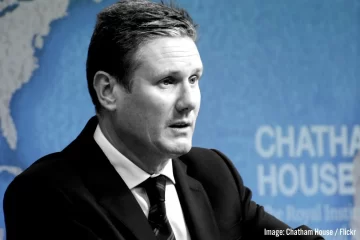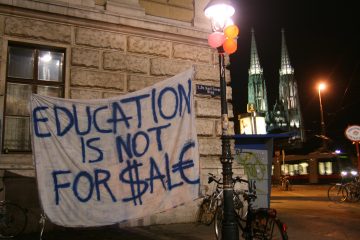Recently the BBC, surprise surprise, made a slanderous video titled “Marxism: what it means, and is it an insult?”. The video was made in light of the recent verbal attacks against Jeremy Corbyn and John McDonnell by prominent Conservative politicians calling them Marxists. In the five minute video, “academic experts” give at best a schoolboy’s attempt at describing what Marxism is, with the usual tarnishing of its name by associating it with Stalinism and “repressive, murderous regimes”.
Reams and reams of smears have been printed by the ruling class against Marxism since the time of Marx himself. This is not because the ideas are dead or irrelevant, but rather the exact opposite. Marxism and the ideas espoused in the Communist Manifesto published in 1848 are as relevant and true today as they have ever been. No other theory can explain the inherent crises of capitalism, nor explain why the system has developed to cultivate a handful of billionaires who own more wealth than half the planet’s population combined.
The video does its best to imply an association of Marxism with the crimes of Stalinism. However these have absolutely nothing to do with genuine Marxism. Marx, Engels, Lenin and Trotsky always held that socialism was international and democratic, or it was nothing. This is in stark contrast to the likes of Stalin who actually stifled the cause of worldwide revolution for the interests of a totalitarian bureaucracy. (You can read more on that here).
Moreover the fact that Stalin went to enormous lengths to purge, detain and murder thousands of communists all across the world should tell you all you need to know about what he thought of genuine Marxists.
What is Marxism?
Marxism is a philosophy, a science and a method. Its ideas and theory were founded and developed by Karl Marx alongside his long-time collaborator and friend Frederick Engels in the mid-nineteenth century. They built upon the work of enlightenment philosophers and classical economists, including Hegel, Riccardo, and Smith. Together they developed the most comprehensive and correct critique of capitalism to which even some capitalists have had to concede, most glaringly so after the financial crash of 2008.
Marxism has three component parts. This includes philosophy, historical materialism and economics. At its heart is the philosophy of dialectical materialism. Dialectics, which Hegel developed, is the logic for understanding change. All matter exists in a constant state of flux. Although the things around us may appear to be solid, from the ground beneath us to the chair we are sitting on, below the surface of initial perception there are numerous internal moving contradictions. Science and geology for example has shown that there are enormous pressures moving below the earth’s apparent solid surface which build over time to suddenly collide or explode in the form of earthquakes or volcanic eruptions at weak points.
Dialectics, from this position, leads us to understand that the process of change is a process of quantity being turned into quality. From water being turned into steam at exactly 100 degrees Celsius, to a child turning into an adult, there are a number of quantitative changes which take place below the surface which qualitatively change something into its opposite.
The philosophy of dialectics is not purely a scholastic question, but one of great significance, especially so when applied to society. Whilst through our day to day experience everything around us may appear calm and never fundamentally changing, there are actually tensions built up in society which reflect the internal contradictions within it. As Marx and Engels point out in the Communist Manifesto, since the advent of class society, the main contradiction of social relations has always been between classes:
“Freeman and slave, patrician and plebeian, lord and serf, guild-master and journeyman, in a word, oppressor and oppressed, stood in constant opposition to one another, carried on an uninterrupted, now hidden, now open fight, a fight that each time ended, either in a revolutionary reconstitution of society at large, or in the common ruin of the contending classes.”
The development of class society to the stage of capitalism, which has spread its tentacles to all corners of the world, simplified class antagonisms into two deeply hostile camps: the bourgeoisie (capitalists), and the proletariat (wage labourers). This conflict can be overcome in numerous ways, such as using the media, police, religion, art etc. But fundamental to the survival and sustainability of any mode of production remains its ability to develop the productive forces – including industry, science, culture, and technique.
But whereas previous revolutions in the mode of production gave birth to new class antagonisms, Marx and Engels were so far sighted to understand that the next mode of production, the socialist transformation of society, would abolish the class system itself with the coming to power of the working class. The capitalist system, with the enormous productive forces it has developed over centuries, has cultivated a highly developed working class now numbered in its billions.
This working class, under capitalism, is reliant upon receiving wages to buy back the commodities they produce. Marx explained that the capitalists’ profits come from the surplus value produced by workers, over and above what is required to pay their wages.
Due to competition between capitalists, there is a constant struggle over working conditions. Capitalists are forced to cut wages, or increase the hours worked by their workers, so as to maximise their profits.
Therefore, in order not to sink into destitution, workers are forced to unite in order to struggle collectively for their interests. Workers are brought together in massive factories where the productive forces can only be worked socially. No one worker can say “I made this car, it should belong to me”. Through the process of social production and collective struggle, the working class develops a collective – i.e. socialist – class consciousness.
The owners of the productive forces however number ever fewer capitalists, as according to the logic of the market, free market capitalism is transformed into monopoly capitalism. Marx and Engels therefore explained that although capitalism was initially progressive – by smashing feudalism, and developing large scale industry on a worldwide basis – at a certain stage capitalism would become a barrier to the further development of society.
Private ownership by a tiny handful of society would become incompatible with the possibilities of social production on a global scale. Although we have the productive capacity to end hunger, solve homelessness, and provide decent healthcare for all, these things do not happen since profit stands in the way.
Only the working class could set free the potential of the productive forces, by bringing them into social ownership, and planning production for need. Thus Marx and Engels grasped the revolutionary potential and role of the working class: “What the bourgeoisie therefore produces, above all, are its own grave-diggers.”
Is Jeremy Corbyn a Marxist?
Although Jeremy Corbyn is a sincere fighter for the working class, he himself is not a revolutionary or a Marxist, despite what some Tories may think. His idea is to try to reform capitalism, to try make it work better for workers, whilst still allowing a tiny handful to own nearly everything.
Of course we agree that the rich should pay more tax. But trying to collect it off them is another matter. A whole industry exists for squirreling away money offshore, as the Panama Papers revealed. Already the rich are talking about “Corbyn-proofing” their wealth. If Corbyn comes power, they would try every means at their disposal to bring such a government down.
Even if the rich could be made to pay the taxes that Corbyn proposes, it would not be nearly enough to even reverse the cuts of the last nine years. Nor would it stop capitalists from shutting down factories or going bust; a phenomenon rooted in the global crisis of capitalism.
However, if Corbyn is to be elected prime minister and fully carry out a programme of ending austerity, nationalising significant parts of the economy and implementing progressive reforms to benefit the working class, he will inevitably face the revolutionary consequences of trying to do so. Either he will have to go all the way, and mobilise the working class to take power out of the hands of the capitalists, or he will have to backtrack, and submit to their power.
Well intentioned left reformist leaders like Alexis Tsipras to François Hollande are clear examples of the question of reform or revolution. Both of these ‘socialist’ leaders capitulated to the demands of capitalism whilst trying to implement their programme to end austerity. The same question will be posed to Jeremy Corbyn. Our tasks as Marxists must be to send a clear message to break with capitalism, and carry out the socialist transformation of society.
Ravi Mistry




0 Comments